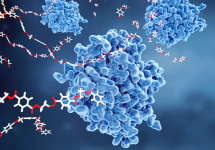
Many industries use enzymes and bioenzymes, and it's helpful to understand how they work. Enzymes are complex molecules, typically proteins, that make biochemical reactions occur faster. A biochemical reaction breaks down biologically derived soils such as blood, edible greases and oils, pet stains, etc. Enzymes fracture the molecular structure of biological soils so that they can be more easily flushed away. Each enzyme has its own niche of pH, temperature, dilution and time that allows it to be the most effective.
A bioenzyme is produced by microbes. When a particular microbe is placed in the right biological environment (that is, a place with the right temperature and correct food source), that microbe will produce enzymes that digest biological soils. That’s where the prefix “bio” comes from. Bioenzymes provide an important advantage to the cleaner: the microorganisms continue producing enzymes as long as a food source exists. When the food is consumed, the microorganisms either die or go into a dormant state and stop their enzyme production. The system is self-limiting or self-sustaining as needed.
One downside of microorganisms is that they need some time to multiply and start making the enzymes. As a result, you have to be a bit more patient with bioenzymes than enzymes. An enzyme-based product will start working in 15 to 20 minutes under normal conditions, but a bioenzyme may require an hour or longer to start working.